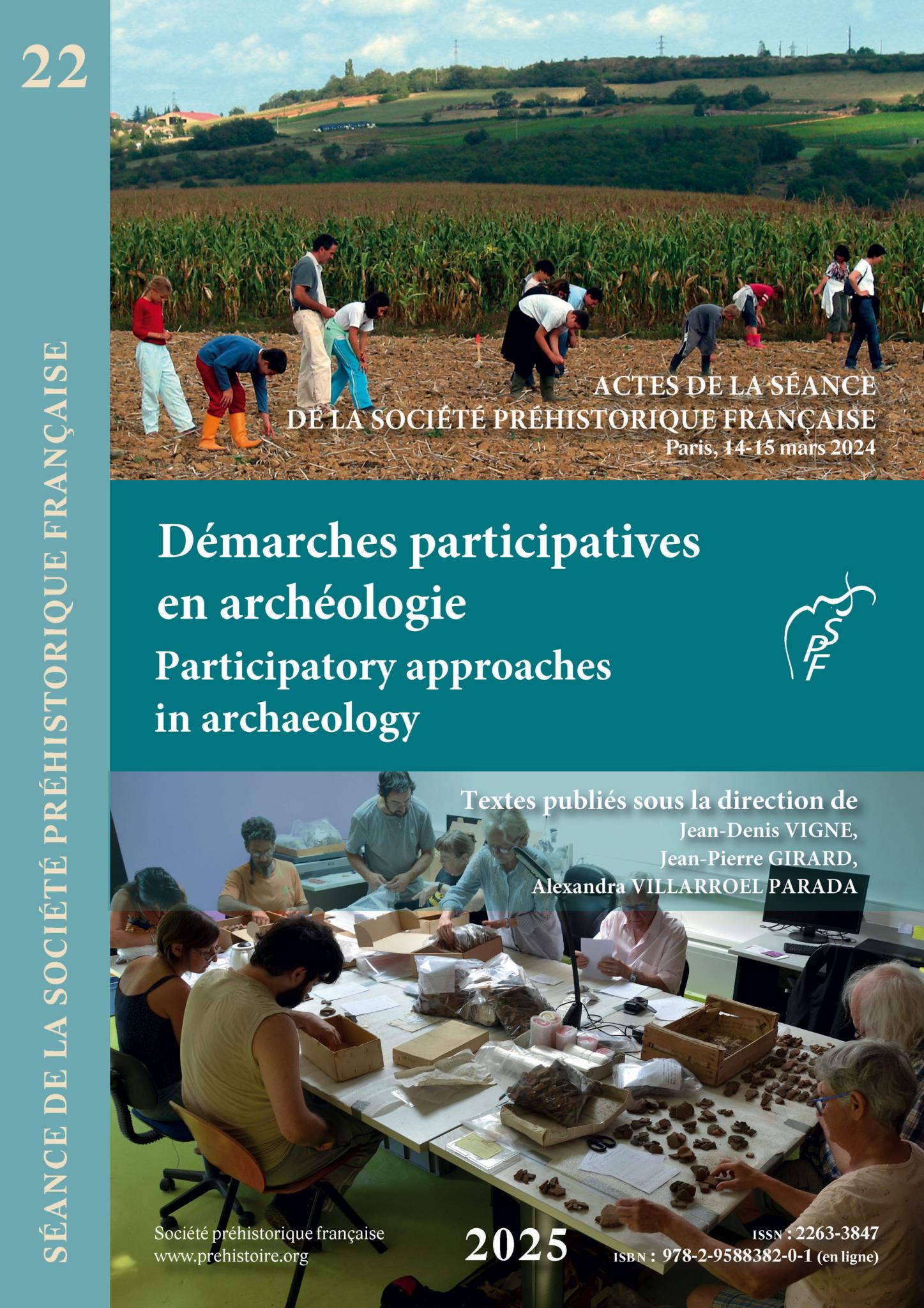
DÉMARCHES PARTICIPATIVES EN ARCHÉOLOGIE
Participatory approaches in archaeology
Actes de la Séance de la Société préhistorique française,
Paris, le 14-15 mars 2024
Textes publiés sous la direction de
Jean-Denis Vigne, Jean-Pierre Girard, Alexandra Villarroel Parada
(Séances de la Société préhistorique française, 22), 339 p.
www.prehistoire.org
ISSN : 2263-3847 – ISBN : 978-2-9588382-0-1 (en ligne)
Accès à la page des séances en accès libre
La Société préhistorique française permet le téléchargement gratuit de certaines de ses publications. Fidèle à ses traditions, la SPF veut ainsi être une fenêtre dynamique et accessible au plus grand nombre sur la recherche préhistorique en France et dans le monde.
Régie par la loi de 1901, sans but lucratif, la SPF vit des cotisations de ses adhérents.
Pour nous soutenir, n’hésitez pas à adhérer et à susciter de nouvelles adhésions autour de vous.
Pour suivre nos actualités et bien plus, abonnez-vous à la Newsletter de la SPF
Tous les fichiers sont en accès libre. Cliquez sur le titre de l'article pour le télécharger / All files are in open access. Click on the title of the paper to download it
Télécharger le volume complet
En archéologie, comme dans de nombreux domaines de connaissance, émergent de plus en plus de projets participatifs, définis comme « des formes de production de connaissances scientifiques auxquelles des acteurs, non scientifiques professionnels, participent de façon active et délibérée » (Houillé et Merilhou-Goudard 2016). Ces recherches se caractérisent par le double objectif de produire des connaissances scientifiques (par le recueil, l’analyse ou l’enrichissement de données) et de viser un apprentissage et une montée
en compétence citoyenne, que ce soit sur le sujet d’étude, sur la méthode scientifique ou plus largement sur les démarches de recherche ou de patrimonialisation.
Organisée à l’initiative de la Société préhistorique française dans le cadre de ses Séances, en lien avec la sous-direction de l’Archéologie du ministère de la Culture, la table ronde des 14 et 15 mars 2024 avait pour objet de rendre visible le plus grand nombre possible d’initiatives participatives de recherche et de valorisation du patrimoine archéologique, qu’il soit préhistorique ou historique. Au-delà de cet état des lieux, elle aspirait à croiser les expériences des différents acteurs, à identifier les éventuels freins et à dégager des opportunités.
À terme, il s’agira aussi d’aider les institutions à promouvoir l’archéologie participative et à mieux l’intégrer dans leurs stratégies.
As in many other fields of knowledge, more and more archaeological participatory projects are emerging. They are defined as “forms of scientific knowledge production in which actors who are not professional scientists participate actively and deliberately” (Houillé and Merilhou-Goudard 2016). These research projects are characterised by the dual objective of producing scientific knowledge (by collecting, analysing or enriching data) and helping citizens learn and develop their skills, whether in terms of the subject under study, the scientific method or, more broadly,the research or heritage enhancement processes.
Organized on the initiative of the Société Préhistorique Française as part of its Séances, in tight connection with the French Ministry of Culture (Sous-Direction de l’Archéologie), this round table (14-15 March 2024) aimed to give visibility to as many participatory initiatives as possible, whether prehistoric or historical. As well as assessing the situation, the aim was to compare the experiences of the various actors involved, identify any obstacles and highlight opportunities. Ultimately, our aim is also to help institutions promote participatory archaeology andintegrate it more effectively into their strategies.
SOMMAIRE / CONTENTS
Jean-Denis Vigne, Jean-Pierre Girard, Sandrine Grouard, Alexandra Villarroel Parada, Manon Vuillien 11
Introduction et analyse croisée
Introduction and cross-analysis
QUESTIONS D’ARCHÉOLOGIE PARTICIPATIVE
Robin Furestier 25
Lutter contre Indiana Jones : ambitions, risques et limites de la démarche participative en archéologie
Fighting Indiana Jones: ambitions, risks and limits of the participatory approach in archaeology
Nicolas Naudinot, Annette Flageul, Laure Merceron, Véronique Duigou 33
Les collaborations entre bénévoles et professionnels comme pierre angulaire de l’archéologie préhistorique armoricaine
Advocational/professional archaeologists collaborations as a cornerstone of Armorican prehistoric archaeology
FOUILLES ET INVENTAIRES ARCHÉOLOGIQUES
Lionel Barriquand, Claire Gaillard, Didier Accary, Pierre-Guillaume Denis 47
L’Association pour la recherche et la valorisation des grottes d’Azé et du Mâconnais-Clunisois, cheville ouvrière entre bénévolat et institutions
The Association for the Research and Development of the Caves of Azé and the Mâconnais-Clunisois Region, a linchpin between voluntary work and institutions
Corentin Biets, Sih Natalia Sukmi, Pipit Meilinda, Mohammad Mirza Ansyori, Titi Susilowati Prabawa, Anne‑Marie Sémah, François Sémah 65
Interdisciplinarity, participatory and preventive approaches in archaeology: Towards a new prehistoric and cultural heritage management model in Java, Indonesia
Interdisciplinarité, approches participatives et préventives en archéologie : vers un nouveau modèle de gestion du patrimoine préhistorique et culturel à Java, Indonésie
Érik Langevin, Noémie Plourde 81
Pour une réelle archéologie collaborative postcolonialiste avec les Premières Nations de la communauté de Mashteuiatsh au Québec
For a truly postcolonial collaborative archaeology with the First Nations of the Mashteuiatsh community in Quebec
Fabienne Dugast 97
La vallée de l’Eure (Eure ; Eure-et-Loir) : un territoire propice pour développer la démarche participative en archéologie de terrain ?
The Eure Valley (Eure; Eure-et-Loir, France): a suitable area to develop participative research in field archaeology?
Boris Valentin, Béatrice Bouet, Alexandre Cantin, Patrick Dubreucq, Jean‑Yves Lacroix, Émilie Lesvignes, Isabelle De Miranda, Michel Rey, Éric Robert, Laurent Valois 109
Quelle archéologie collaborative autour des grès ornés préhistoriques en Île-de-France ?
What kind of collaborative archaeology around prehistoric decorated sandstones in Île-de-France?
PROSPECTIONS-INVENTAIRES
Marie-Yvane Daire, Elías López-Romero 127
Patrimoine littoral et sciences participatives : retours sur expérience des projets « ALeRT » et « ALOA »
Coastal heritage and participatory science: feedback on the “ALeRT” and “ALOA” projects
Yoann Chantreau, Gadea Cabanillas de la Torre, Aurélie Crowch, Muriel Fily, Elena Paillet, Audrey Lavrand, Jean-Manuel Conilleau, Valérie Corolleur 139
L’essentiel c’est de participer ! Le rôle de l’État et des collectivités territoriales dans le soutien et l’animation de l’archéologie participative bretonne
What counts is taking part! The role of the state and local authorities in supporting and promoting participatory archaeology in Brittany
Mathieu Rué, Jean Duriaud, Grégory Compagnon 149
Trente ans de prospection au sein du Groupe de recherche archéologique de Tournus(Saône-et-Loire) : exemple d’une démarche participative en milieu associatif
Thirty years of prospection to the Archaeological research group of Tournus (Saône-et-Loire): example of a participative approach in an associative sector
Dominique Bosquet, Élise Delaunois, Christelle Draily, Véronique Moulaert, Olivier Vrielynck 161
La légalisation du détectorisme en Wallonie : bilan 2019-2023
Legalization of detectorism in Wallonia: 2019-2023 review
Estelle Gauthier, Jean‑François Piningre, Hervé Grut, Patrick Mosca, Patrick Guillot, Jean‑Baptiste Caverne 177
Vingt‑cinq années de recherches participatives dans le secteur de Salins‑les‑Bains (Jura) : quand le détectorisme vient appuyer la recherche archéologique programmée
Twenty‑five years of participatory research around Salins‑les‑Bains (Jura): when metal detecting supports programmed archaeological research
CORPUS
Jean-Pierre Girard 191
« Bulliot, Bibracte et moi » : une recherche participative appuyée par l’intelligence artificielle pour la transcription collaborative d’archives archéologiques du site de Bibracte
“Bulliot, Bibracte et moi”: participatory research supported by artificial intelligence for the collaborative transcription of the Bibracte archaeological archives
Gwendoline Torterat, Jean-Denis Vigne, Alice Laforêt, Émilie Lesvignes, Claude Mordant, Sylvain Ducasse, Jean‑Marc Pétillon, Roland Nespoulet, Romain Julliard, Alice Lemaire, Lucie Aguglia, Ludovic Mevel 207
Contribuer à l’histoire de la préhistoire à partir du fonds photographique de la Société préhistorique française (1900-1925) : le projet « Préhisto-Photo » à la croisée de l’associatif et du participatif
From associative to participative: a contribution to the history of Prehistory from the photographic collection of the Société Préhistorique Française (1900-1925)
Amélie Aude Berthon, Alyssa Giraudo 223
Artefacts, base de données collaborative en ligne des objets archéologiques : introspection d’un projet d’archéologie participative
Artefacts, a collaborative online database of archaeological objects: an insight into a participatory archaeology project
Guillaume Lépine, Olivier Gabory 231
« Âge de Pierre, haches de pierre(s) » : retours sur un projet unique de recherches participatives sur le Néolithique en Maine-et-Loire
“Stone Age, stone(s) axes”: feedback on a unique participatory research program on the Neolithic period in the Maine-et-Loire region (France)
Éric Chariot, Vincent Boudon Thierry Coppin, Aurélia Cheyrezy, Vincent Guichard, Florent Mathias, Stefan Wirth 245
Archéoastronomie : vers une approche scientifique, pluridisciplinaire et participative
Archaeoastronomy: towards a scientific, multidisciplinary and participatory approach
Sotiria Gavrou, Tatiana Theodoropoulou, Lionel Gourichon 257
Le passé et le présent de la pêche en Méditerranée : du collaboratif vers le participatif
The past and present of Mediterranean fishing: from collaborative to participative
PATRIMONIALISATION
Clément Venco 271
Les projets communaux d’Archéologie des territoires dans les Pyrénées centrales : une expérience d’étude et de valorisation du patrimoine archéologique en milieu rural
The communal projects of archaeology of territories in the central Pyrenees: An experience of study and enhancement of archaeological heritage in rural areas
Aurore Di Liberto, Stephie Reichert, Georges Majerus 287
Le projet « Aurora ». Une collaboration entre l’association des Amis du prieuré d’Useldange (APU), l’université du Luxembourg et l’Institut national de recherches archéologiques
The “Aurora” Project. A collaboration between the association Les Amis du Prieuré (APU), the University of Luxembourg and the Institut National de Recherches Archéologiques
François Martel-Asselin, Virginie Motte 299
Les hommes des cavernes du volcan de La Réunion, sentinelles de l’histoire
The Reunion Island volcano cavemen, sentinels of history
Dimitra Mazaraki, Maia Pomadère 315
Comment impliquer les populations locales dans les activités archéologiques en Grèce ? Premier bilan d’un projet participatif sur le site de Malia (Crète)
How to involve local communities in archaeological activities in Greece ? First insights from a participatory project at Malia (Crete)
Estelle Bertrand, Élodie Salin 327
Démarches participatives et inscription du patrimoine archéologique à l’Unesco : analyse comparée des cas des enceintes romaines du Mans (France), de Lugo (Espagne) et de Rome (Italie)
Participatory approaches and Unesco listing of archaeological heritage: comparative analysis of the Roman city wall of Le Mans (France), Lugo (Spain) and Rome (Italy)
mise en ligne le 19/11/2025
Dernière modification : 21/11/2025



